Rwanda
Thirty years ago, while hiding from the machetes that killed his father, two of his brothers and an estimated 800,000 others during the genocide against Rwanda’s Tutsi minority, Pascal Kanyemera made a deal with God. “Please, if I survive one more week, I will give you 100 Rwandan francs.”
God listened, and the 16-year-old prayed again. And again. And again, until the killings stopped in July 1994.
“At the end of the genocide, I owed God 400 Rwandan francs ,” Kanyemera, now 46, says from his home in Ottawa, the Canadian capital. “That shows you how much I have always put my life and survival in his hands.”
His grandmother, uncles and cousins were also among the thousands of Tutsis killed by Hutu extremists in massacres that lasted more than 100 days.
The genocide was triggered on 6 April 1994, when a plane carrying President Juvénal Habyarimana , a member of the Hutu majority, was shot down as it was about to land in Kigali, the capital of Rwanda. The Tutsi were blamed for shooting down the plane and killing the president. Enraged, bands of Hutu extremists began killing Tutsis, with the support of the army and police.
Kanyemera was hiding in a local school when his family was massacred on April 9. He learned of their deaths in late May, when he was reunited with his mother and sisters in a French-controlled refugee camp.
Massacres
Other Tutsis witnessed these massacres firsthand and barely survived to tell the story.
In her book, Chosen to Die: Destined to Live, Frida Umuhoza recounts how her mother was beheaded before her eyes. She watched her grandfather, Bible in hand, plead with his killers to let her family pray together one last time. She shuddered as the Hutu extremists urged her to choose the weapon with which she would be killed.
“Please don’t kill me with anything else,” said Umuhoza, who was terrified of machetes and opted for a club.
Soon after, the 14-year-old girl was struck in the back of the head and everything went black. When she woke up, her heels were split open and her body was covered in dirt in the ditch where her family lay. She lay numb for hours until one of her Hutu neighbours took pity on her and rescued her from a life of grief, orphanhood and anger.
“Sometimes when people hear about what happened to us, they don’t believe it,” Kanyemera said. “Some men killed their children, their own children. Out of hatred.” Healing, he said, is a long process. But many survivors cling to faith to bring peace back into their lives.
Umuhoza explains in her book how becoming a Christian allowed her to forgive. Another survivor, Immaculée Ilibagiza, recounted how she hid for 91 days in the tiny bathroom of a pastor’s home. Now an author, speaker and devout Catholic-based in the United States, Ilibagiza often talks about how reciting the rosary brought out the pain and rage within her.
Patrols
Kanyemera - the current president of the Humura association, which supports genocide survivors - has always attributed his survival to God.
Hutu militias patrolled the school where he was hiding, looking for Tutsis living nearby, but he was never caught. And although the Hutus planned to kill the surviving Tutsis in the refugee camp he was headed to, French troops took over before Kanyemera arrived, so he survived.
As painful as it may be, many survivors cling to the memory. They go to schools to tell their stories to younger generations. They write books. They talk to journalists, willing to reopen their wounds year after year, in the hope that no genocide will ever be committed again.
"Someone said that he who forgets the past is condemned to relive it ," said Tarcisse Ruhamyandekwe, who lost a brother, uncles and aunts in 1994. "Our people, our families, were killed in unusual circumstances, so this is a way of giving them back the dignity they didn't have."
During the genocide, Hutu extremists were extremely brutal . The killings were often preceded by beatings, torture , and mutilations. The militias chanted "Kill them all" before reaching the homes of the families they were going to exterminate. An estimated 100,000 to 250,000 women were brutally raped, many of whom later required corrective surgery or treatment for HIV/AIDS.
"Rwanda was full of dead bodies ," says Ruhamyandekwe, who also lives in Ottawa. "Imagine going back as a survivor and finding in your house only the bodies of your brothers and sisters."
Like Kanyemera, he fled Rwanda to seek safety. His first stop was Congo, where his parents sent him in 1985, fearing an escalation of violence against Tutsis.
Discrimination
Survivors like them have stressed that the genocide was born out of long-standing animosity between Hutus and Tutsis.
“ I remember when I was 7 or 8 years old, I saw my father being taken to prison by the military ,” Ruhamyandekwe recalls. “I remember thinking he was lucky because he had come back. Other people were not so lucky; they were killed in prison.”
According to him, discrimination was inflicted on Tutsis from a very young age. Schools required teachers to keep a detailed register of students. It was common for them to enter classrooms and say: "All Tutsis, stand up!"
“We carried our identity papers to show our race and we couldn’t escape ,” Ruhamyandekwe said. That’s why during the genocide it was very easy to ask, ‘Where is your identity card?’ and have the Tutsi killed.”
His father was not a victim of the Hutus, but when he died later in the 1990s - probably of a heart attack - Ruhamyandekwe was unable to bury him. "Taking that risk, going back to Rwanda, was probably going to get me killed," he said.
He has no photos or material possessions from his life in Rwanda, but his memories of the land of a thousand hills remain intact. A few years ago, he took his children there.
Of the house where his parents, both teachers, raised him in comfort and love, only traces remain in the ground. And it is there, with his hands in the air, that he "drew" the house of his childhood for his children.
“I showed them where my room was. My brother’s room, my sister’s room ,” Ruhamyandekwe said. “I told them: This is the house where I grew up, but everything has been destroyed.”
Sharing his feelings has not been easy. He says Rwandans are not open to emotions, even within their own families. Crying or confiding in someone is discouraged from a young age. For him, however, writing has been like therapy. And there has been his faith.
“In my book, I talk about what I call the invisible hand of God ,” Mr Ruhamyandekwe explains. “Some say it’s luck, but I say it’s God who guided me through all the trials I went through.”
In writing, he did not just express himself, he tried to make known the history of his people.
"We cannot forget our loved ones ," Mr Ruhamyandekwe said. "If reconciliation is to take place, as it is now, we must remember and teach the next generation what happened."
"Someone said that there is something stronger than death: It is the presence of the dead in the memory of the living."



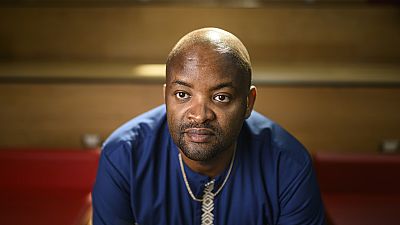

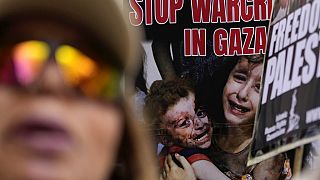
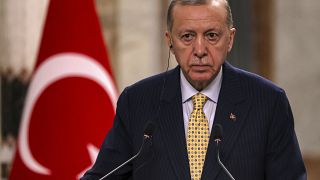
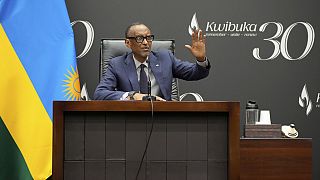
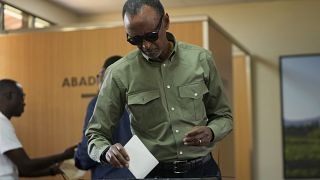


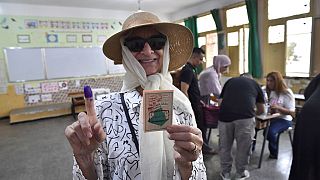
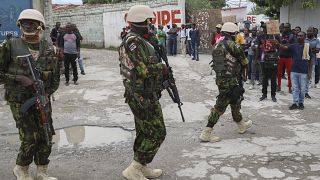
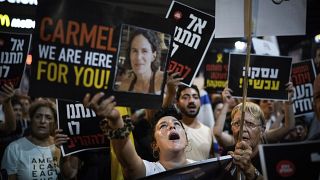
Go to video
ICJ: Turkey wants to join South African complaint against Israel
01:10
World marks 29th anniversary of the Srebrenica genocide
01:00
Honoring Srebrenica, a call for remembrance and solidarity
01:03
"We are ready to fight," President Kagame responds to DRC
01:06
South Sudan: UN assesses security in community impacted by violence
01:21
At least 41 dead in latest militant attack in the eastern DRC